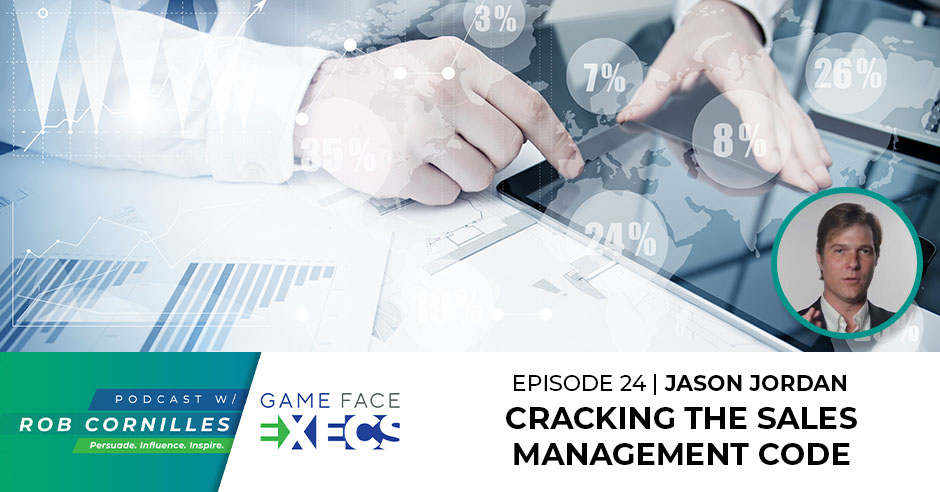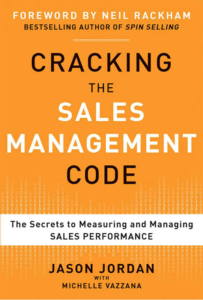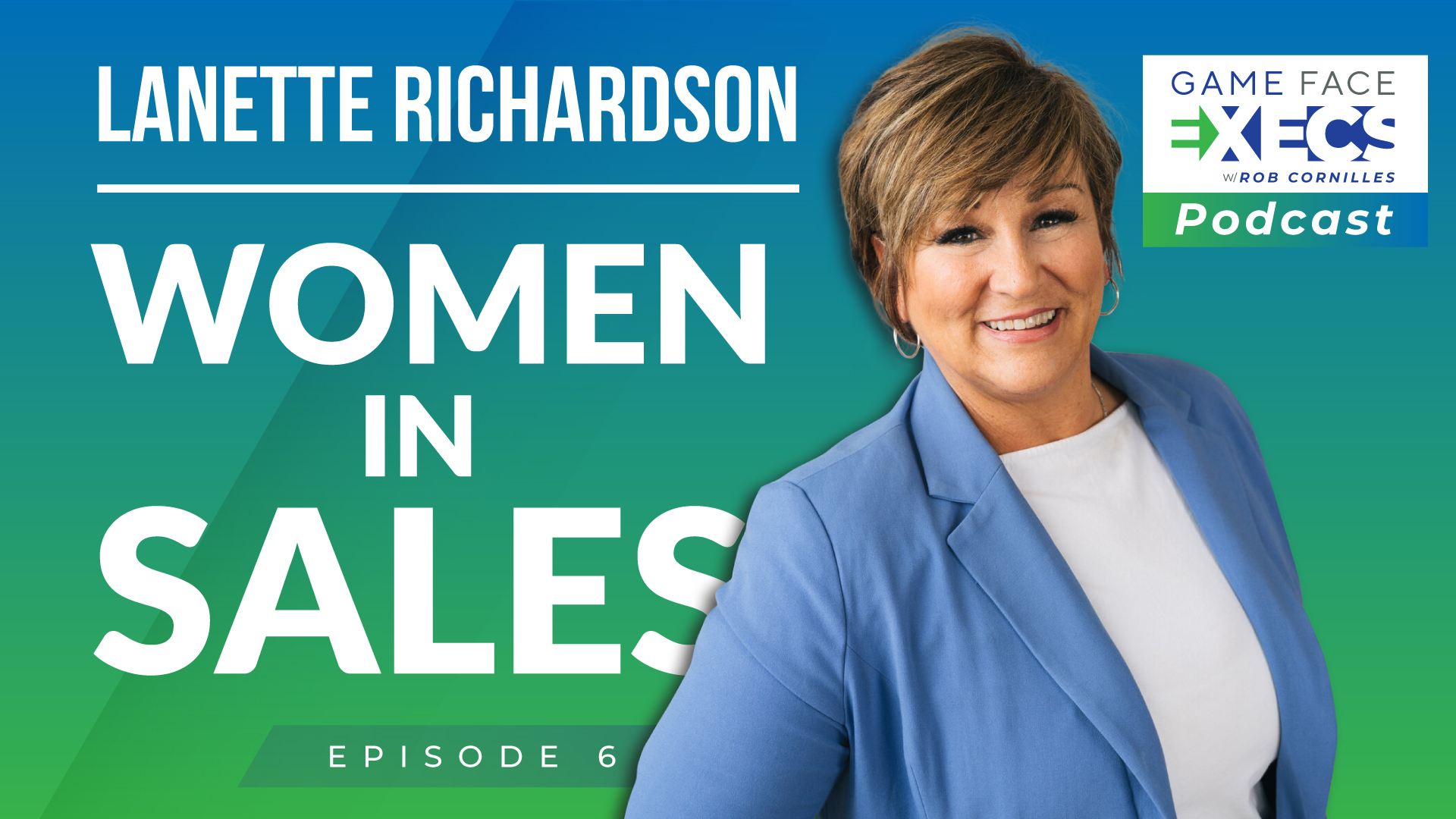
Many of us understand the value of sales in any company, but there has not been a lot of focus on sales management in the last decade. Sales management expert Jason Jordan saw the need to tap this area of sales and wrote the book, “Cracking the Sales Management Code,” which has since been a staple on the reader’s lists of MBA courses in major universities. Jason is a bestselling author and sales consultant who focuses on sales management best practices, sales metrics, pipeline management, CRM, leadership development and more. Joining Rob Cornilles in this episode, he shares the important realizations he had in his sales career that prompted him to write a book about sales management. He also sheds light on the critical role of frontline sales managers in ensuring smooth processes in all aspects of sales.
—
Watch the episode here:
Jason Jordan | Cracking The Sales Management Code
I want to thank Jason Jordan for joining us on the show. Jason, it’s great to have an author and an educator like yourself to participate in these conversations. Welcome to our show.
Thanks, Rob. I’m glad you’re having me.
Jason, as you and I have spoken before I am a fan of yours, the books that you’ve published and the articles that you’ve written. You have a very interesting career path because most people either want to be an author from day one or want to get into business and then authorship comes down near retirement. In fact, I had a conversation with an executive, who’s nearing the end of his career. I asked him, “What’s the one thing you still want to do?” He says, “I want to write a book.” It’s not an easy thing to have a bestseller as you have and to be an influencer in the sales industry like you have been. Tell us a little bit about how that started. Did you intend to be a researcher and an author, or did you just discover things in the sales industry and recognize that you’ve got to share some insights and some discoveries with the rest of us?
Thank you for the compliments along the way. It was an interesting path. I don’t know that anyone has a path in their career, but I started out in sales right out of college with 100% commission, hardcore sales. I went to business school. It’s funny. This was before the dot-com boom. When I was coming out of business school, you went to banking or consulting. Those were your two choices and there was no idea of being an entrepreneur. I went into consulting.
In every management consulting firm I went to, I was the only person who had any sales experience. Anytime there were sales discussions, it’s like, “Go get Jason. He can talk about sales.” Most of my career was consulting. Anything you can do in a sales force, a comp design, territory design, process design and CRM implementation, all of it. I was going down that path and I had respect for authors. I didn’t necessarily have the intention to be one.
It was like my life’s thing, but when I was in sales, throughout my career, I was reading Neil Rackham. He was very influential. I got fortunate enough to work for him and consider him a friend now. The SPIN Selling and Rethinking the Sale are all legendary books. He is a great guy. Solution Selling, all the classics and Miller Heiman’s books. I respected people who could create content. What Neil told me one time about writing was very interesting. He said that, “Writing forces clarity of thought.” The best authors are good at presenting complex things in very simple ways. While most authors try to present simple things in complex ways to make it seem more than maybe it is.
The way the book came about and I’ll be brief with the story because I know we want to go on to other things. I was at American Express’ headquarters in Manhattan, and this has got to be several years ago. I don’t even remember what the project was but during break and coffee and stuff. One of the guys said, “I was in the room believe it or not with the global head of sales of American Express.” I’m sure he’s 1 of 500 people. The head of sales asks an interesting question. He said, “How do I know if my salesforce is any good?” He went on to say that, “If my European revenues are growing faster than North American, does that mean I’ll have a better salesforce in Europe?” “I don’t know. What are the regulatory environments? What’s the competition like? Give some more examples.”
He’s like, “How do you know if salesforce is any good?” As a sales consultant, I felt that I should have an answer. That’s one of those things that when you’re driving around by yourself and those moments where you reflected, I started thinking about it and I said, “Let’s look at some sales reports, some management reports.” If people are bothering to gather and report data, this must be what they think is the definition of good. Measuring ourselves against good. The book came out with this interest and understanding of how people were using CRM and what reports, what measurements they were using. I played with the concepts for a while. I put it into a presentation and some folks had hired me to go do roadshow stuff because they were interested in the industry.
I was giving a presentation at a random conference and a guy from McGraw-Hill came up and said, “I thought that was interesting. Here’s my card.” I thought it was a sales leader, trainer or something, but he was just looking for fresh content. He said, “Would you like to give a proposal?” I gave him a proposal, they accepted it and then I wrote a book. I avoided all of the writing a book and having to shop it and no agents were involved. I fell into it in all the right ways, but I did fall into it. It was a good experience. People ask me, “How it is to write a book?” My only response is, “It’s long.” I spent about a thousand hours just writing the book. Not counting all the stuff that went into it, but that was a good process. It was fun. It definitely clarified my thinking. That’s what my people have been drawn to the book or at least that’s the feedback I get is it’s approachable. It’s nothing engineering about it. It’s common words and common concepts. I’ve been very fortunate in that way.
[bctt tweet=”In trying to implement change in sales processes, implementation success always comes down to the frontline sales manager.” username=””]
As I’ve told you before, Jason, I teach an MBA course at a major university and Cracking the Sales Management Code is on our reader’s list. It’s required reading within our course. My students have always benefited from it. It spurs conversation and a little bit of debate, but they walk away, grateful that it’s on that list. It’s one of the few books that focus at least that I have appreciated. It’s one of the few books that focus on management. We have a lot of sales, methodology books. I’m coming out with a book on sales methodology. Sales management is one that I think we’re all scratching our heads constantly trying to figure out. I’ve got to ask you a couple of questions about the origination of the book. The title itself, Cracking the Sales Management Code, it suggests something has been hidden from us. What was the thinking behind that? What did you discover that caused you to put that title on it?
There are a couple of things to talk about there. You’re right. There’s not been a lot of sales management-focus. At the time that book came out, it was late 2011. I went on to Amazon and looked for sales management books. They weren’t there. Since there’ve been several good sales management books that have been written, whether the time was right or maybe I spurred some interest in the area, but that may be a little overly ambitious and indulgent. Understanding my career, I was a management consultant. I came at all of these issues from a management’s perspective. I didn’t spend my entire career in sales.
I had a career in sales, but I didn’t go straight from being a salesperson to writing a book. I’ve been studying management issues. What I realized in trying to implement change and this is a truism that people have come to realize. If you’re trying to make any change in a Salesforce, whether it’s implementing a new training program, new process or implementing CRM, in my experience managing those projects, the implementation success always came down to the frontline sales manager. The frontline sales manager understood it and bought into it. It would at least get done 75%. If the sales manager didn’t understand that it wasn’t behind it, it became the third priority and it just never happened.
It’s a truism. That was the interest in particularly frontline sales management. The title, I have to give credit to my co-author, Michelle Vazzana. I live in Charlottesville, Virginia. I live on an old farm situation. In here, any property over 5 acres has outbuildings that have been converted into cottages or whatever. I have my cottage out behind our house with the guest cottage and that’s where I do my work. Michelle was down, she lived in the DC area, we had outlined the book and we put the poser together. We got to have a name, we need a name for it. I said, “The name is obvious. It’s Focused Sales Management because that’s what this is all about.”
The entire book in focusing sales management and salespeople on doing the right things. She said, “That’s stupid. No one is going to buy a book called Focused Sales Management, how about Cracking the Sales Management Code.” That’s where it came from. To your point, it did crack open some ideas. The standing idea that we manage outcomes. If you could manage quota, everyone would make their quota. It shifted the focus to the activities. Since I’ve had many people say, “We’ve been running our Salesforce like that for years. I can’t imagine running it any other way, focusing on the activities and what people are doing and what we’re providing by way of enablement.”
The last ten years have been transformative for the sales management discipline. I think that maybe the time is just right. Maybe people have gotten as far as they can with the existing training, methodologies, and all the stuff that they’ve poured at the sales team. Technology has definitely changed and has been a huge enabler and that’ll continue to change in the salesforce for a while, but the fundamentals of management and coaching are immutable.
I certainly would like to talk about that with you. Let me go back to the chicken and the egg question if I could, what does come first? Is it great management, a great sales leader or a great salesperson? What would you rather have if you had to pick one?
I take a great sales manager every time. Neil Rackham would say the same thing. He’d say, “If I had a choice between having ten rockstar salespeople or one rockstar sales manager every time because that gets replicated.” The scenario people describe is, “We take our best salespeople and we promote them into sales management.” We lost our best salesperson and we created a shitty manager. You have done double damage. The question is, “Can you take someone who’s not a great salesperson and make them a great sales manager?” My response to that has always been, you can’t take someone who’s incompetent at sales and make them a sales manager, because they don’t know what good looks like, or they can’t look at something and go, “This is wrong.”
There’s also an issue of credibility to promote someone who is a peer who’s not respected into a management role. You can’t promote bad salespeople into management positions, but I think you can promote average and better than average people that have management capability. If I was given a choice between having ten great salespeople or two great sales managers, I’d take the sales managers every time because I feel that within 24 months, we have twenty great salespeople instead of ten. There’s a span of control of 10 to 1, which is maybe a little high, but not unrealistic.

Cracking the Sales Management Code: The Secrets to Measuring and Managing Sales Performance
In one of your articles, you talk about a 30,000% ROI. I love that article. It came out in 2017, 2018 if I’m not mistaken, I could be wrong. Could you talk about how a salesforce or an organization could get a 30,000% return?
You could still get that vantage points website if you look. You have a choice. You can train your entire salesforce of salespeople. Let’s say you have 100 salespeople and 10 sales managers. You can train your entire sales team of a hundred people and spend a bunch of money and maybe you’ll get some lift, or you can spend 1/10th of that train your sales managers. I believe you get an even greater lift because the research that vantage point has done over time has shown that sales managers are the leverage point for improving sales performance. It’s a simple observation and simple math that I’d rather train the ten sales managers before I trained a hundred salespeople every single time. That’s a dividend that is going to keep giving. As more salespeople rotate in, the sales managers are still there. It’s a much better and much more leveraged model of focusing on improving a sales team.
Excuse me for the fundamental nature of this question, but I want to make sure that our audience is following what you’re saying. When we talk about training sales managers, are we talking about making them better salespeople themselves? What do you mean exactly by training them? If I’m going to invest that money in 10%, where am I directing it specifically?
Let’s look at it this way. The sales managers are trying to change the behavior of the salespeople and the salespeople in turn are trying to change the behaviors of the customers to obviously buy from us. I’ve reversed-engineered the question. Plenty of people will say, “Here’s what we need to be doing in front of the customers. Therefore, here’s how we need to train the salespeople.” I don’t stop there. I say, “If this is what we want, the salespeople would be doing, and this is how we train the sales managers.” For instance, if we wanted the sales team to make better sales calls, and we even defined that. Asking better questions, or having a specific agenda beforehand, or maybe communicating that agenda before you get into the specific practices of what you want the salespeople would do.
You can train the salespeople to do that or you can train the sales managers to train daily. We reinforce that constantly, sit down and coach them to, “We’re going to sit down and plan this call and you write them an agenda. You’re going to email that before to the person you’re meeting with, and then we’re going to record it or I’ll join you.” That sales manager had that same conversation ten times. It’s more powerful than training the salespeople to do it because the sales manager takes ownership of it. They can oversee it. As I said, salespeople are coming and going, management is a little more stable than salespeople. That investment is a little stickier than another way. I always reverse-engineer it from the behaviors you want in the field. I don’t stop with a sales salesperson. I take it back a level to the sales manager because if the sales manager understands and motivated, the sales manager can make it happen.
Do you find in your experience then, Jason, that sales managers are as receptive to coaching as frontline salespeople?
I think more so even. They want it and they don’t get it. There have been times in my career when we train sales managers and then we train the sales manager’s manager to coach the manager. That’s an interesting thing. You’re a salesperson and you get coached. It’s an expectation, particularly the younger generation, the more they expect it. It’s part of the value proposition of working for you is that you’re investing in them and their development. It’s pretty common to think, “We coach the salespeople and the sales manager does that,” but it’s weird to think that once a person’s a sales manager, we don’t need coaching anymore. We need them to make the reports and do the stuff.
What we found is not only when you engage the coach’s coach, not only does the manager like it, because it’s an investment in them that they’re not typically getting. Oftentimes the coaches, the coach likes it as well. The VP of sales is like, “I haven’t coached anyone in fifteen years. This is pretty rewarding. I like this.” I had a real job of managing people. All the way to the CEO and the CEO has executive coaches. He or she has people that are working with them to keep them home. It’s a weird thing that we think once we take a great salesperson and promote them into a management position, then we’re done. Magic is going to happen.
Jason, you know Game Face, the company that I lead started in 1995 in the sports industry. Our clients were a lot of the teams right around your area in the DC Virginia area. When we began the notion that you would train or coach executives for a sports team was a head-scratcher to most organizations. It’s like, “Why do we need coaching?” Just put out a better product on the ice, the field, or the court and we’ll sell more, whatever it is, sponsorship, tickets or suites. This is several years ago, I had convinced sports teams as they train players the best in the world at what they do.
[bctt tweet=”You can’t take someone who’s incompetent at sales and make them a sales manager, because they don’t know what good looks like.” username=””]
They’ve probably should also devote resources to training their executive team. Now, thankfully, it’s just a given in our industry of sports. I don’t work entirely in sports anymore but it is still a large part of our business. That was just an expectation people like you said, young people expect it to be a part of the value proposition. Why they will say yes to a potential employer is because they get coaching from it. From that experience, that employment and more managers are asking us, “What about us?” It’s interesting. Some industries are way ahead of this and you probably have been a catalyst to that. In other industries, there’s still that same old view that as seasoned veterans, we don’t need the training and the coaching. Just help those young folks. That’s a sad commentary, but it’s still out there, maybe not so much with the large B2B enterprise companies that you work with. I still see that in a lot of small businesses. I don’t know if you have any opinion on that.
Someone once said or I once read that, “When you’re in your twenties, you learn the trade and in your 30s, you’ll learn the tricks of the trade. If you don’t keep learning, by the time you’re in your 40s and 50s, you’ll only have the tricks.” It resonated with me that at 35 or 40, you can’t know everything you’re going to need to know. Some people come to that with disposition. People just liked her and people are driven. They like to read. Now, the websites, YouTube and things that you can develop yourself. Other people get to 40 and they’re like, “We’re good.”
I think you’re right that larger companies are more focused on executive development. They’re focused on succession planning and things like that. Whereas in smaller companies, it’s not part of the game because it’s expensive bringing people in to deal with the executives and the time it takes and trying to find the right person because there’s a lot of personality stuff that goes on at the executive level. Finding the right person to train or coach. It’s time-consuming and resource-consuming to continue to develop people. It’s easy to get a sales training course for 1,000 salespeople.
You’ve noted in your writings that it’s even more expensive not to develop your people.
Yeah.
Let’s go back to Cracking the Sales Management Code. You did a lot of research. You pulled from your own experiences. I’m sure you pulled from your own mentors if you will and people that you learned from. In that research, as you were writing the book, was there anything about your findings or your conclusions that surprised you when it finally went to print? When you began writing it, you didn’t think you would have discovered this particular point or truth about sales management, but after concluding it, you had converted yourself almost.
I don’t think so. In that book, we’re on a quest for reality. We were trying to define what we saw around us. What are sales processes? Why do you measure and what do you measure? We were trying to find foundational components. It’s like discovering math like, “One plus one equals two.” That’s surprising. You’re like, “No, we just didn’t know one plus one equals two until we wrote a one, a plus sign, a one and an equal sign and a two.” Now, it’s obvious. That’s why some people gravitate toward the book and why it ends up in universities. I’ve used it when I teach at university and other professors use it as well that I know because I think it’s foundational. Other stuff that I’ve done, I’ve been surprised because I was on a quest but in this case, we were just trying to write it down.
A word that you’ve talked about a lot in your writings and one that is the core word in the work that I do is the word, results. You mentioned that a lot in your book and you make a very clear point that you have to be able to define the results you want in order to be a good sales manager. Do you find and have you found over the years that in your work with various organizations that it’s not clearly defined because it seems so basic? Do you have to start with the result in mind before you can go to activities and tactics, but do some not get that or do some get it backwards?
People understand the desired outcome clearly, which is to hit your quota and to hit your budget or your target, but that’s where a lot of people stop. I don’t think there’s any shortage of people knowing what the outcome is they want. It’s a shortage of people knowing how to get there. In reality in salesforce, you’re given the outcome. It’s called a quota and remarkably you’re often not guided on how to get there. That’s what the work we did at VantagePoint was all about it.

Sales Management: There is no shortage of people who know what outcome it is they want. There is a shortage of people who know how to get there.
You talk a lot about tools that sales managers must use. The one that’s become in vogue over the last many years is CRM. I like how you beat it up though. By that, I mean we assume that we need a customer relationship management system. You talk about how that’s wrong and we’ve let it get away from itself. Can you share with the audience how you view CRM and maybe where we’ve lost track of what its original intent was?
It’s funny you say original intent. I was a consultant in the late ’90s and Siebel became a thing. In the early 2000s, when everyone had to have it, customer relationship management started out as exactly that it was like, “Marketing customer relationship management, software sales used it.” There was a piece in there’s a module in CRM called Sales Force Automation, SFA. Their SFA practices started popping up and we don’t talk about sales force automation. We don’t use those terms anymore, but it’s funny because I think that’s what has become, has never evolved far beyond that. If you look at the core of CRM the way most people use it, it’s a way to track opportunities and contacts.
We took Act! which is everyone’s favorite software who’s ever been in sales, who has been around since the ’80s and ’90s and it took Act! and put opportunities in it. That’s what we now have and we call CRM. Now we have marketing automation that does a lot. The terms are a little bit convoluted in the way that it’s evolved. What we have is sales force automation and the thing that we called it that it would be a little clearer exactly what the scope and reasonable expectations are for that software that is sales force automation. People treat it as a strategic advantage. It’s funny because we still hear people talk about, “What’s the ROI of CRM?” No one talks about what’s the ROI of email.
CRM is infrastructure. You don’t need to justify it anymore. You don’t need to talk about the ROI of your cell phone or the ROI of Outlook any more than you don’t need to talk about the ROI of Salesforce.com. It’s just there. The challenge is, now that everyone has it, how do we use it? The fundamental idea that it’s a tool there to support better selling is lost on a lot of executives. They see it as a pipeline and reporting tool. If I’m cynical, if it weren’t for forecasting, I don’t know that a lot of sales leaders would give a damn about CRM. We need a forecast, we need a pipeline because we have a pipeline, we need CRM and then that’s where a lot of it stops. It’s a shame because it’s the backbone. It is the plumbing of the Salesforce and it’s not a free-flowing.
If you wouldn’t mind, I’d like you to elaborate on that a little bit more. How are we using traditional CRM incorrectly in the sales world?
It’s a tool to enable salespeople. It’s not a tool to enable reporting. It’s viewed from the top-down, not from the bottom up. I’ve talked to people over time and they’ve said, “When we started putting activities into the system and tracking things that were correlated to productivity, then CRM became useful. Using it as a pipeline and reporting tool is not all that great. That’s why salespeople don’t like to use it. All I’m doing is giving this machine data, then the machine gives that data to someone else in a different form. Salespeople get some value out of reporting. It’s so funny, you don’t have to make people use Outlook. You don’t have to make people use their cell phone because it’s inherent to them what the value is.
You have to make people use CRM because it’s not inherent what the value is. That tells me that we haven’t valued engineered CRM or sales force automation in a way that says, “How could the users of this find it useful?” Also, I say that quickly, “That’s overly complicated.” I had some sales operations person said that as soon as he implements a new CRM tool, he envisions himself as the mechanic, under the hood of a car, just pulling out hoses and wires. They try to sell it so feature-rich and they sell that as the value proposition. Whereas I think, the value proposition should be there like four buttons and three reports and six things that you need to do in this, but they’re the important things. It’s grown beyond its usefulness, ironically, at the same time, it’s not proving itself to a user.
Thus, the lack of or the low number of adopters in most offices is it’s a constant struggle, a tug of war to get your salespeople to use the CRM. Because they don’t see an inherent value, how is it going to help them make a sale? As I’m understanding you describe it, they think it’s simply a mechanism to provide reports to the people upstairs, but for them, they have more important things to do. They got to make a commission and that means they got to get back on the streets or back on the phone, you get to interact with customers. They’re not seeing how CRM helps them get there. Is that a fair summary?
That’s very fair. It’s a database of records. That’s what CRM has become in most sales forces. I will say that this whole industry, particularly around Salesforce.com because they sell a very rudimentary product. It doesn’t have a lot of great reporting. They know they know this. They put the AppExchange in place and they want people to build all these extra capabilities around what is this simply defined CRM tool. There are many great tools out there that do add value. They’re expensive. If you mapped out what salespeople do and thought, “How could we enable this?” That’s where you started building CRM, you’d have a different CRM. We go in and go, “We need a forecast and new management reporting. Now, how do we get that?”
[bctt tweet=”A CRM is a tool to enable salespeople, not a tool to enable reporting.” username=””]
That’s how you backed into CRM. It’s not, “Here’s the sales process.” If we have strategic account managers, what in there is helping them manage their accounts more strategically? Are their data feeds bringing in alerts to their strategic accounts where every morning when they log in, like, “Some new executive at this division over here. I need to call that person.” If it’s lead generation, you’re pursuing opportunities. If you log in to CRM, “Are there opportunities there? Are there leads? I’d log in to see that.” If we could just map out what salespeople do, identify the places they need to enable that, and enable that through CRM, then people would love CRM. That’s not the way, it’s an architect and that’s not cynical, but I’ve seen it many times in my mind it’s become reality, in a form. Maybe I’m being a little too pessimistic.
Another term that may get you up on your hind legs as well. We talk about it constantly. I want to get your reaction. When I use the two words, pipeline management, what does that mean? What should it mean in your experience?
Pipeline management is not what takes place, what takes place is data management in most cases. When we’ve all said in these meetings where there’s a salesperson and there’s a sales manager, and they’re going through the pipeline and what they’re doing is they’re updating close dates. They’re updating dollar amounts, they’re updating probabilities, that’s forecasting. They’re scrubbing the forecast. Pipeline management is when you’re doing something to improve the effectiveness and productivity of the sales pipeline. Good pipeline management looks like coaching. Pipeline management in most people’s minds is just keeping the data clean and making sure that as deals get at the later stage, they’re treated a little bit differently.
I would use pipeline management and coaching almost interchangeably. The pipeline is the nexus for almost everything in most sales forces. It’s where we keep the activity like, “What are people doing?” They’re working on these deals is where we keep the deals is where we generate the forecast. The pipeline is the centerpiece and most sales. When you see what meetings are taking place, salespeople and sales managers talking about stuff in the sales pipeline. The pipeline report is what they go through. It’s mostly viewed as a stage along the way, it creating a forecast. It’s seeing what deals are coming in the near term, which is another way of saying forecast. It should be a coaching tool.
With these best practices and perhaps some inherited worst practices, I’m interested to know if you’re able to share with us, who are some organizations that you admire for the way that they are managing their Salesforce and their sales system? Any companies that you can illustrate that they’re enabling people properly and exercising these principles on a day-in and day-out basis?
I see good practices in almost every salesforce. I’ve never seen a salesforce that I would hold up as perfect. I’ve worked with very large companies that are held up as operationally excellent companies and they are, but there’s always something. I’ve been in various small companies that were innovative and thought about things in the way that you probably should because they had probably 1 or 2 leaders. If those 1 or 2 leaders had a square head on their shoulders, then things went well. We’ll get into a big company and they’re pockets of things that are going very well. I don’t think I’ve ever seen one company that I said, “This is it,” but I’ve picked best and worst practices along the way. You probably had some experience I would guess.
A couple of more questions, if I could. If someone aspires to be in sales management, whether they’re young or middle of their career, what advice are you going to give them if you’re mentoring them? What should they be doing now so that when the opportunity is presented to them, they qualify and when they get the job, they excel?
There are two different things. To qualify, you to have to be a good salesperson. Probably demonstrate some interpersonal and some political skills. There’s a way you get to be promoted to sales manager, which is through success. If you wanted to think about, how do I become a good sales manager? I had the same advice I’d give to existing sales managers who want to become better sales managers. As a salesperson, I would ask myself the question, “What would a great sales manager do for me? How could a good sales manager make me better, more effective and successful at my job?”
If you think about it as like, “You spent some time helping me go through deals, but not just to scrub the data but to point out, to test me, to push me on how might I do this?” Perspective is what’s lost. People become sales managers and they think they need to be in this headspace of sales manager, but what they’re going to be is in the headspace of the salesperson and understanding what they need to succeed. If a sales manager got up every day and thought, “What can I do today to make Jason a better salesperson,” rather than get up and think, “How am I going to get to the quota?” I think they’d be more effective at their job. As a salesperson, thinking through how I send you to succeed, you get the opportunity and then you become the sales managers that you wanted to have that you never, ever get.

Sales Management: Over time, we’re just finding better ways to do the fundamental things that salespeople need to do.
Jason, as a thought leader within the sales space and as one who has obviously been a part of innovating good practices for sales management and the like, where do you think the industry is going in the next few years? I know that’s a loaded question because the economy is in an uncertain space and we’ve got pandemics. We’ve got some communities and industries that are a bit in unrest. If you were to put that thumb out there, where are you seeing us a year from now, five years from now and what should we be doing to prepare for the future as sales managers?
I have what’s not a typical view for someone who’s supposed to lead thought and things. Change comes very incrementally in sales. We think the internet came and everything changed in a day and CRM came and everything changed in a day. The internet, the CRM or sales force automation was very rudimentary when it came. What we’re seeing is we’re just getting better and better at what we’ve always been doing. I had this idea that we have no new problems in sales. We just have unsolved problems in sales and the data point I like to use. It was a book called Birth of a Salesman. It was written by a Harvard professor years ago and it’s a great story.
It’s a little bit academic in the way that reads, but there’s a quote from a salesperson. It says, “My sales manager is gone about systematizing sales. Now, I spend all day chained in my desk doing reports.” It’s in 1927. I don’t think things have changed as much as we think they have changed. The internet and LinkedIn, but LinkedIn when it started wasn’t LinkedIn than it is now. What we’re doing overtime is we’re finding better and better ways to do the fundamental things that salespeople need to do, which identify opportunities, qualify them, demonstrate value through the sales process and shepherd the buyer across the finish line. If you’re managing accounts, the things that you do when you manage accounts.
I don’t think the sales motion has changed in 100 years. The tools we have and the way we viewed it has gotten sharper over that time. That’s going to be a trend that continues. I don’t see many revolutions. In fact, I’ll give you one final comment on the question. When the internet came about everyone said, “This is the death of the salesperson.” This is a cynical way. I can’t believe I’m saying it out loud because it’s so cynical. Like, “Why would someone interact with a salesperson if they didn’t need to?” That was the thing is, “Salespeople will be replaced by websites. We’ll never need to see a salesperson again.” People that I respect in the industry was like, “Half the salespeople will be gone in ten years.” That would be devastating to the sales career.
I did this several years ago, but I went back to 1999 and I looked at the Bureau of Labor Statistics in the United States and looked at how many salespeople there were. What percentage of the workforce was employed in sales? It was 2015 or ’14. Several years later, I went back and looked at the percentage of the workforce that was in sales. It was exactly the same. It was like 14.1 versus 14.3 or something. It was negligible distinction in the composition of the workforce. We need salespeople. Now, what has to happen, salespeople will evolve. The salesperson, of now is much more valuable than the salesperson fifteen years ago because they had this realization like, “My salespeople know as much about my products as I do because they can go to the website. They can read reviews.” The internet pushed salespeople into a different place but again, it’s been incremental. We’re getting better at our craft.
Can you give us any peek into what you’re writing next? What topic you’re particularly pursuing now or is that something we’ll just have to read about?
As you and I were chatting about, in fact, some of it. I wrote a book and I published it in 2017 under a pen name. This 2020, I republished it under my name. It’s called Sales Insanity. I don’t know if you’ve come across that one. It’s twenty stories of the stupidest stuff I ever saw in my career of sales. I love that book. I’m as proud of that book as I am of Cracking Sales Management Code but in a very different way. It was a lot of fun to write and people have been inspired but the topic that I’m intrigued with now is very timely is video conferencing.
Sales certainly, but any profession who uses video conferencing in the way that we are now. This is truly unprecedented with the amount of video conferencing is taking place for obvious reasons. I’ve got a couple of research instruments and surveys I’ve put out trying to understand, what are best practices, what we’re doing now, and how should a professional interact with the camera and the background. If you have an important meeting coming up with another executive or whatever, how do you orchestrate that? In the same way that Cracking Sales Management Code was driven by curiosity, I’m genuinely curious in this. This is different than we would have been doing before. There’s going to be some writing coming out of that. The research is coming in and I think it’s timely, but we’ll see what’s after that. We’ll see what other questions I can’t answer.
That particular question about video conferencing, it’s a wonderful area to pursue. I think it would be very valuable as you and I have discussed previous to this, I see a lot of bad examples of salespeople trying to sell through video conferencing and their intent is good. Their heart is in the right place, but their presentation, their professionalism is suspect.
[bctt tweet=”We have no new problems in sales, only unsolved ones.” username=””]
I’m not on sales calls anymore in the way that I used to be. Every morning, I watch the financial news during the day. You see the folks reporting from their houses, their homes, and this is on national television, global television. I can’t believe this person thinks this is a good idea. There’s no reference point. Maybe I’m going to foundationally define the way you work with a video camera. We’ll see.
I know exactly what you’re referring to. I’ve said to you with someone who’s sitting underneath a ceiling fan and it looks like a helicopter is descending on their head or they’re they look like they’re in their hallway. Granted, I like the rawness and the authenticity that this has forced us to adopt and customers like it too. It’s fun to talk to a salesperson when they’re in their kitchen or when you can hear their kids playing in the background. It makes everything more human.
We’re trying to establish credibility, but I was talking to a professor who also teaches sales. He was saying, “That’s a fascinating idea. Do you mind if I take this idea and start putting together some research and do some academic research on this?” You’re not only there, how do you have a first interaction where you’re trying to build credibility and establish that you’re right? He said, “What about three months later at the end of the sales cycle, do people still have the same expectations? You probably wouldn’t be in the kitchen and your first call with your kids in the background. Maybe it’s endearing once you have a relationship to have that personal view.” This is such interesting idea. Until people started bringing their business into their homes like an earnest, these issues never popped up. That’s where my head is now just because of the nature of my life.
I encourage my audience to be following Jason Jordan, see what’s coming out next. Jason, how could someone find you if they wanted to pursue more, the things that you’re sharing with us?
LinkedIn is the best place to get in touch with me.
We’ll encourage everyone to do that. I’m sure I appreciate you spending the time with us. It’s fascinating, the work that you’ve done and the work that you’re going to be doing in the future. We at Game Face appreciate the relationship. We will encourage people to reach out to you then, as questions arise, not only in sales management but even this new topic that you’re now raising. We wish you the best of luck as you continue to provide great instruction to the sales world.
Thanks, Rob.
Take care.
Important Links:
- Jason Jordan
- SPIN Selling
- Rethinking the Sale
- Solution Selling
- Act!
- Cracking the Sales Management Code
- Salesforce.com
- Birth of a Salesman
- Sales Insanity
About Jason Jordan
 Sales management expert focused on developing sales leadership effectiveness in large B2B sales forces. Clients include GE, 3M, Tyco, TIAA, Essilor, Aon, FedEx, Sungard, Gates, and other global organizations.
Sales management expert focused on developing sales leadership effectiveness in large B2B sales forces. Clients include GE, 3M, Tyco, TIAA, Essilor, Aon, FedEx, Sungard, Gates, and other global organizations.
Best-selling author of Cracking the Sales Management Code and Sales Insanity. Conducts ongoing research to advance the discipline of sales management.
Specialties: Sales Management Best Practices, Sales Metrics, Pipeline Management, Forecasting, CRM, Change Management, Leadership Development, and Coaching.





